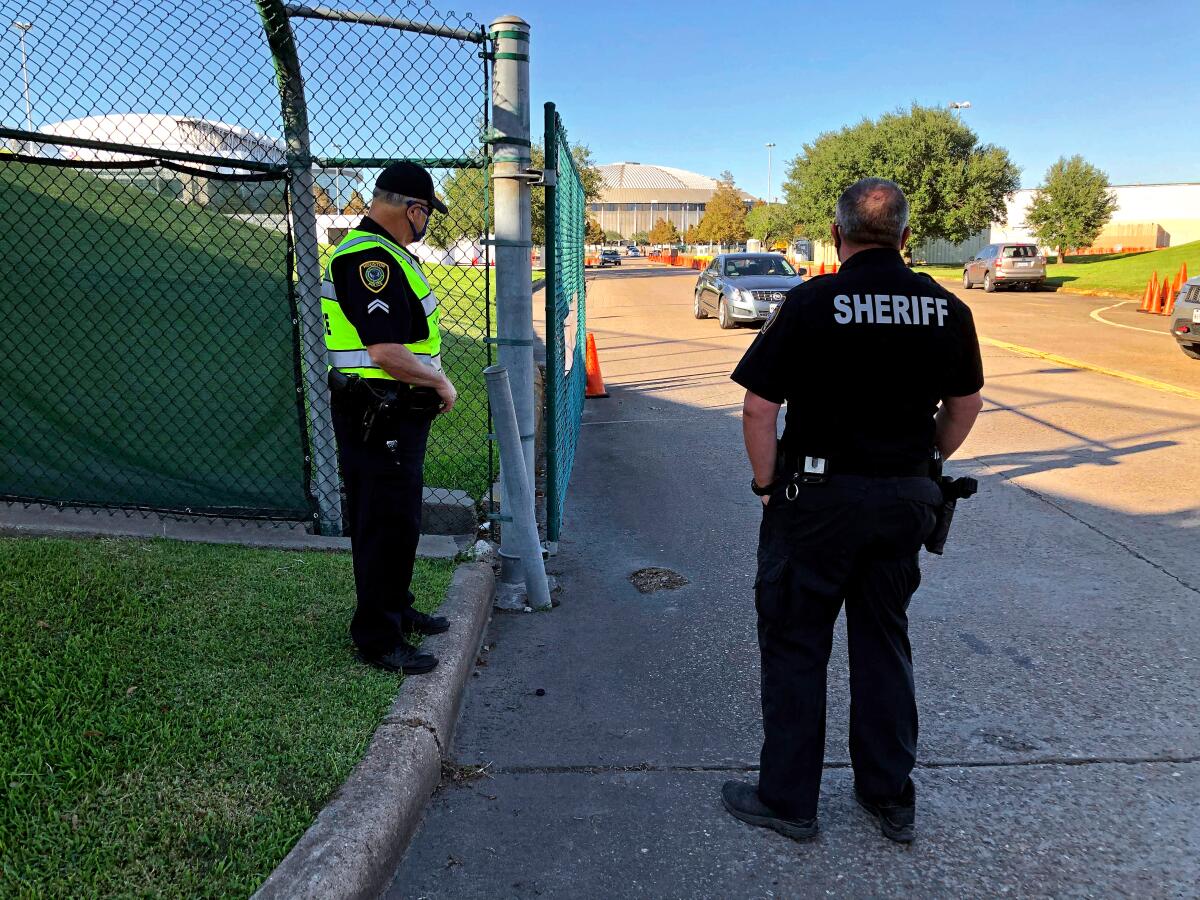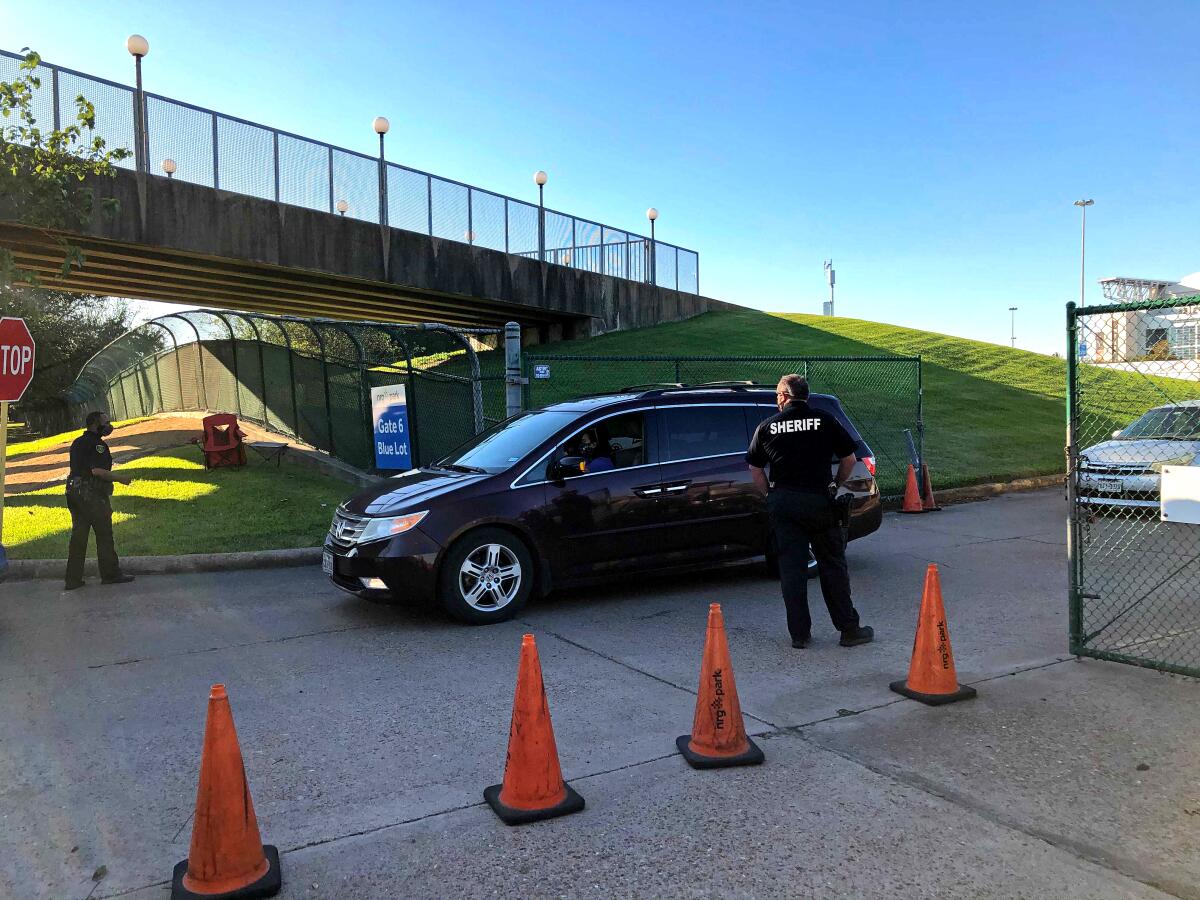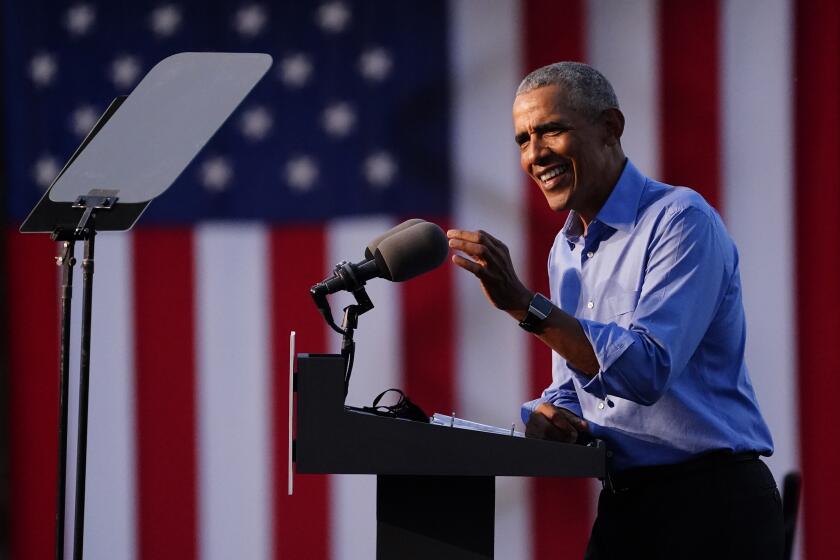How embattled police plan to guard polling stations on election day

HOUSTON — At a time when police face protests against brutality and movements to defund their departments, they are being called upon to secure perhaps the most contentious presidential election in the nation’s history.
Embattled officers across the country are preparing to stand guard against armed groups and voter suppression while also aware their very presence could intimidate voters.
“We’ve never paid as much attention to an election, monitoring for threats, as we have this one across the nation. We’ve never had more expressions of concern from the public as we have this election cycle,” said Houston Police Chief Art Acevedo, president of the Major Cities Chiefs Assn.
While 43% of Americans said they were concerned about election interference at the polls, 42% said seeing police there would increase their confidence in election integrity, according to a survey this month by the nonprofit National Police Foundation. Black Americans were twice as likely to say seeing police at the polls would not increase their confidence.
So as police mobilize officers across the country ahead of election day on Tuesday, many are teaming up with prosecutors and election officials for added oversight and legal advice, attempting to reassure the public that they will not intimidate voters or condone vigilantes.
President Obama hit the campaign trail for his former vice president, Joe Biden, in Philadelphia, Obama’s first in-person rally in the 2020 race.
Detroit Police Chief James Craig said his department will be “out en masse” on election day, though not at voting sites.
“We will be in the area if there should be a problem,” he said.
Chicago police have canceled vacation days for those assigned to watch over protests and protect infrastructure. Miami police have also scrapped vacation and time off ahead of election day.
In Houston, Acevedo has been hosting regular phone calls with fellow chiefs across the country about how to secure the election. He’s also on an election security working group with current and former state attorneys general and other elected officials from both parties, “making sure we educate our police officers to make sure we keep the election safe and honest.”

Police presence at the polls will vary by state. In states including California and Pennsylvania, police must be authorized by elections officials, while in others, including Texas, police can be stationed at the polls.
Los Angeles Mayor Eric Garcetti and the city’s police chief reassured voters this week that although police won’t be at the polls, they will be “available to protect our rights when we need them, should anybody through violence or other means try to take that away.”
In Minneapolis, officials called sergeants-at-arms will be stationed at each polling place, monitoring and enforcing a 100-foot buffer zone.
During recent record-high early voting in Texas, Acevedo visited polling places in Houston and increased patrols — uniformed and plainclothes — so that police would be on hand to greet voters and encourage them to point out problems.
“There’s been gratitude for our presence,” Acevedo said.
He plans to have additional uniformed officers at the polls on election day, all 5,300 officers ready to deploy, and added officers on patrol for several days afterward, “because we don’t know when the election will be called.”
The local elections clerk has formed a joint legal and law enforcement task force to monitor social media and respond to reports of voter intimidation or suppression, most of which have not been substantiated so far.
Given the tension surrounding the presidential race, Acevedo said police are preparing to secure any protests that occur on election day — and to make sure voters are not blocked from the polls.
“The 1st Amendment is not placed on hold on election day as long as there’s no interference with the polling places,” he said.
Acevedo, who grew up in El Monte and served as chief of the California Highway Patrol before becoming police chief in Austin, Texas, and later Houston, said he realizes some people fear police, so he’s reaching out to the community to explain why police will be at the polls, he said, “letting them know what our role is: Not to let them be harassed by self-appointed vigilantes.”
Laws concerning whether people can be armed at the polls vary by state.
Only about a dozen states — including California, Arizona, Florida and Georgia — explicitly ban open or concealed carry at voting sites.
Ahead of the election, Michigan Secretary of State Jocelyn Benson announced a ban on guns in and around polling places, “to ensure every voter is protected.”
Minnesota Atty. Gen. Keith Ellison announced last week that a private security company that tried to recruit former U.S. military special operations personnel to guard polling sites in Minnesota on election day had agreed to cancel its plans after Ellison’s office investigated.
“They won’t be doing it again and will not be anywhere in Minnesota before, during, or after Election Day,” Ellison said in a statement.
But leaders of some armed right-wing groups have said they still plan to go to the polls on election day.
Stewart Rhodes, founder of the Oath Keepers, which recruits heavily from law enforcement, said members will be at the polls, in plainclothes and carrying their guns concealed, either as registered poll watchers or monitoring from outside, especially in swing states.
This month in St. Petersburg, Fla., the local sheriff defended the presence of two armed, uniformed, off-duty security guards who had appeared with Trump supporters outside a polling place.
Pinellas County Sheriff Bob Gualtieri, a Republican running for reelection, dismissed complaints that the guards had intimidated voters, and he stationed deputies at early voting sites. St. Petersburg Mayor Rick Kriseman, a Democrat, disagreed.
“There’s zero reason for anyone to be armed, openly armed, out in front of a polling place,” Kriseman said.
Acevedo cautioned fellow police about how they should behave on election day, whether on or off duty: “Be careful that you don’t start trying to act like a vigilante — you may not keep your job as a peace officer if you act like a fool.”
At least one police officer was already disciplined during early voting this month for showing up at a polling place in Miami wearing a mask promoting Trump.
Cassie Miller, a senior research analyst for the Southern Poverty Law Center who monitors armed groups, said they are likely to heed “signals from police, attorneys general and governors that militia activity at the polls will not be tolerated” because “there’s often a friendly relationship between members of militias and far-right groups and law enforcement.”
Miller noted that armed groups often claim to be helping overtaxed law enforcement to secure polling places when they’re really trying to monitor or interfere with voting. Unless police stop them, she said, “These armed vigilantes feel they have the green light to ‘impose order.’”
Sean Morales-Doyle, deputy director of the New York University Brennan Center for Justice’s voting rights and elections program, said police should focus on supporting election officials, “reducing harm and de-escalating tensions.”
“They should be trying to ensure that any obstacles standing in the way of people voting be removed,” said Morales-Doyle, a former assistant attorney general in Illinois, where he participated in election monitoring. “Sometimes that means being on the lookout, being on watch, but not necessarily being at the polls because law enforcement themselves can be intimidating to voters.”
In Philadelphia, election security was tested last month when unauthorized poll watchers attempted to enter several satellite election offices and were rebuffed.
The Trump campaign sued, but a judge ruled in favor of election officials.
“Keep your Proud Boys, goon squads, and uncertified ‘poll watchers’ out of our city,” Dist. Atty. Larry Krasner said in a statement after the ruling last week. “Philadelphians from a diversity of political opinions believe strongly in the rule of law, in fair and free elections, and in a democratic system of government.”
More to Read
Get the L.A. Times Politics newsletter
Deeply reported insights into legislation, politics and policy from Sacramento, Washington and beyond. In your inbox three times per week.
You may occasionally receive promotional content from the Los Angeles Times.












